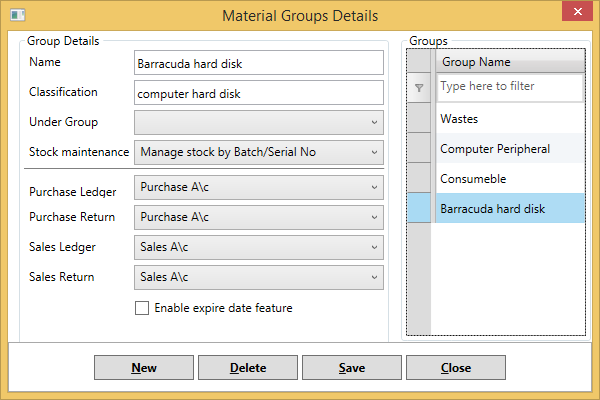
Basic Cash Code Pos Register Software Visual Foxpro Database Repair
Inventory software programs now on the market let you track usage, monitor changes in unit dollar costs, calculate when you need to reorder, and analyze inventory levels on an item-by-item basis. You can even control inventory right at the cash register with point-of-sale (POS) software systems. POS software records each sale when it happens, so your inventory records are always up-to-date. Better still, you get much more information about the sale than you could gather with a manual system. By running reports based on this information, you can make better decisions about ordering and merchandising.
With a POS system:
- You can analyze sales data, figure out how well all the items on your shelves sell, and adjust purchasing levels accordingly.
- You can maintain a sales history to help adjust your buying decisions for seasonal purchasing trends.
- You can improve pricing accuracy by integrating bar-code scanners and credit card authorization ability with the POS system.
Point of Sale Cash Register Systems. Cash Registers have historically been the default solution for a basic POS system. They do have many limitations compared to software based POS systems, but their simplicity and low cost make them a good solution for small businesses just starting out.
There are plenty of popular POS software systems that enable you to use add-on devices at your checkout stations, including electronic cash drawers, bar-code scanners, credit card readers, and receipt or invoice printers. POS packages frequently come with integrated accounting modules, including general ledger, accounts receivable, accounts payable, purchasing, and inventory control systems. In essence, a POS system is an all-in-one way to keep track of your business's cash flow.
Features to consider in a POS system include the following:
Many are used forother reasons, as for instance, when trying to be delicate, we may euphemistically refer to bowel movement asBM, an unprinicipled individual as SOB, and body odor as BO. The first consists ofofficial abbreviations and symbols used in chemistry, mathematics, and other sciences, and those designatingweights and measures, whose exact form, capitalization, and punctuation have been determined by officialgoverning bodies. In this category, they mean only one thing (e.g., kg is the symbol for kilogram and Hz forhertz), and their form, capitalization, and punctuation have been established by the International System ofUnits (Sy steme International d'Unites). Also, it is sometimes difficult to fathom thereasoning of bureaucratic acronym makers, who have created some tongue-twisting monstrosities, such asADCOMSUBORDCOMPHIBSPAC (for Administrative Command, Amphibious Forces, Pacific Fleet,Subordinate Command).Abbreviations and acronyms used in medicine can be grouped into two broad categories. Windows 10 kms key. Abbreviations in the second group, on the other hand, may appear in avariety of forms, the same abbreviation having a different number of letters, sometimes capitalized, at othertimes not, with or without punctuation.
- Ease of use. Look for software with a user-friendly graphical interface.
- Entry of sales information. Most systems allow you to enter inventory codes either manually or automatically via a bar-code scanner. Once the inventory code is entered, the systems call up the standard or sales price, compute the price at multiple quantities and provide a running total. Many systems make it easy to enter sales manually when needed by letting you search for inventory codes based on a partial merchandise number, description, manufacturing code or vendor.
- Pricing. POS systems generally offer a variety of ways to keep track of pricing, including add-on amounts, percentage of cost, margin percentage and custom formulas. For example, if you provide volume discounts, you can set up multiple prices for each item.
- Updating product information. Once a sale is entered, these systems automatically update inventory and accounts receivable records.
- Sales tracking options. Different businesses get paid in different ways. For example, repair or service shops often keep invoices open until the work is completed, so they need a system that allows them to put sales on hold. If you sell expensive goods and allow installment purchases, you might appreciate a loan calculator that tabulates monthly payments. And if you offer rent-to-own items, you'll want a system that can handle rentals as well as sales.
- Security. In retail, it's important to keep tight control over cash receipts to prevent theft. Most of these systems provide audit trails so you can trace any problems.
- Taxes. Many POS systems can support numerous tax rates-useful if you run a mail order business and need to deal with taxes for more than one state.
Perhaps the most valuable way POS systems help you gain better control of your business is through their reporting features. You can slice and dice sales data in a variety of ways to determine what products are selling best at what time, and to figure out everything from the optimal ways to arrange shelves and displays to what promotions are working best and when to change seasonal promotions.
Reporting capabilities available in POS programs include sales, costs, and profits by individual inventory items, by salesperson, or by category for the day, month and year to date. Special reports can include sales for each hour of the day for any time period. You can also create multiple formats for invoices, accounting statements and price tags. Additional reports include day-end cash reconciliation work sheets and inventory management. Examine a variety of POS packages to see which comes closest to meeting your needs.
Every business is unique; you may find that none of the off-the-shelf systems meets your requirements. Industry-specific POS packages are available--for auto repair shops, beauty and nail salons, video rental stores, dry cleaners and more. In addition, some POS system manufacturers will tailor their software to your needs.